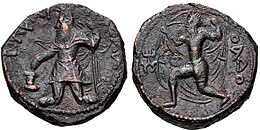
Back Vāju Czech ایزد باد Persian वायु-वात Hindi 바유-바타 Korean Vata Romanian Вайю-Вата Russian Vata Swedish Вайю-Вата Tatar
This article includes a list of references, related reading, or external links, but its sources remain unclear because it lacks inline citations. (November 2019) |

| Part of a series on |
| Zoroastrianism |
|---|
 |
|
|
Vāyu-Vāta or Vāta-Vāyu (IPA: ʋɑːyu-ʋɑːt̪ə) is the Avestan language name of a dual-natured Zoroastrian divinity of the wind (Vayu) and of the atmosphere (Vata). The names are also used independently of one another, with 'Vayu' occurring more frequently than 'Vata', but even when used independently still representing the other aspect.[1]
The entity is simultaneously benevolent and malevolent, that is, depending on the circumstances, either yazata - "worthy of worship" - or daeva, which in the Gathas is a "god that is (to be) rejected". Scripture frequently applies the epithet "good" when speaking of one or the other in a positive context.[1]
In Zurvanism (Zurvanite Zoroastrianism, a now-extinct form of Zoroastrianism), Vata-Vayu represented two facets of the quaternary Zurvan. In this arrangement, Vata-Vayu represented "space" while the other two facets represent "time."
Vayu-Vata has Indo-Iranian roots, and has the same name in historical Vedic religion.[2]
- ^ a b Foundation, Encyclopaedia Iranica. "Welcome to Encyclopaedia Iranica". iranicaonline.org. Retrieved 2024-07-24.
- ^ Cite error: The named reference
:1was invoked but never defined (see the help page).
© MMXXIII Rich X Search. We shall prevail. All rights reserved. Rich X Search